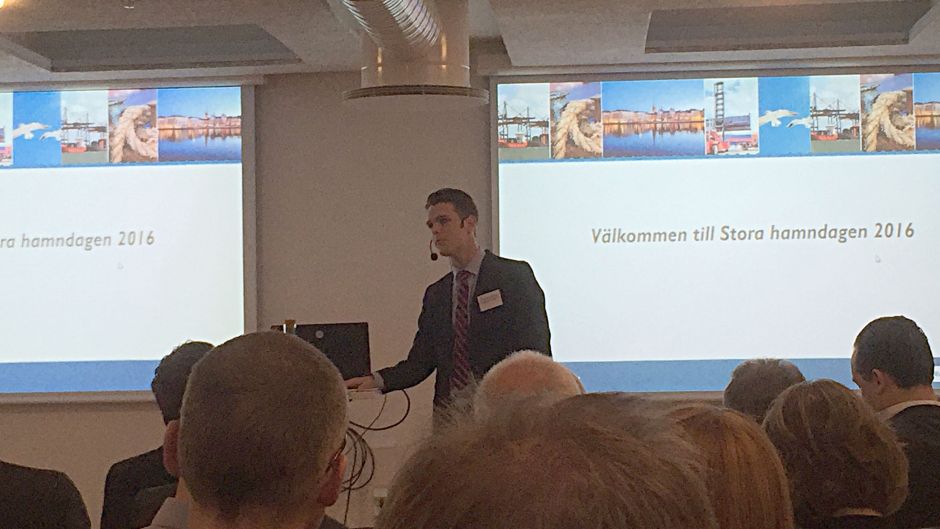The port - an actor with million job opportunities

Everyone should sit down and study the harbour, said MEP Christoffer Fjellner, who was a speaker at the Harbour Day.
- We are depending on ports, perhaps more in Sweden than in many other countries. In Europe, 1.5 million jobs are directly linked to ports. For continuous growth, we should make use of the ports, Christoffer Fjellner says.
How several countries in Europe has succeeded as maritime nations is something that fascinated Christoffer Fjellner, who argued that the tonnage tax has major impact.
- It must not remain true that Sweden is a trading nation but not a maritime nation. We are arguing to little about ports and shipping. For example, traffic charges are not perceived as "high politics". There should be more conflicts to increase the interest, according to Christoffer Fjellner.
Christoffer Fjellner´s interest started from his work with with trade and environmental issues. He saw a clear connection between the different questions.
- The maritime sector should be thinking about trade policy and trade issues to a higher extent, but also environmental issues. It is very likely that a NOx directive will be realised, the only question is when and how, Christoffer Fjellner says.
During the conference, not only the issue of the importance of ports to Europe was brought up, but also questions such as the Swedish Transport Administration's national plan, inland waterways and fairway dues.
According to Lena Erixon, Director General of the Swedish Transport Administration, there is a large potential when it comes to ports and shipping. The Swedish Transport Administration has during the autumn delivered an infrastructure proposition which should lead to national action plans. Orientation folders shall include analyses of what to do with policies already decided, what can be done with the policy decisions that have been announced and what can be done with additional policies and procedures to reduce transport greenhouse gas emissions cost-effectively.
In terms of construction and maintenance, the Transport Administration is strongly linked to road and rail but also has responsibilities linked to ports such as dredging of waterways.
Lena Erixon presented several challenges that will become important in the future.
- We are dependent on import and export for our welfare. A robust system requires actions and priorities. For instance, road network needs more resources to the collateral than we have. Otherwise we lose our functions. Efficient and reliable logistical systems are required, and to improve the system we look at shipping. The infrastructure must also be climate secure, Lena Erixon says.
- We believe in new technology. We want to support demonstration projects and see the effects. The government and the industry are skilled at working in Sweden and we want to participate, and build on, Lena Erixon says.
- Reducing emissions is perhaps one of our greatest challenges which requires instruments. Looking at shipping one perceives a great potential and prospects for reduced emissions. National transportation needs to take advantage of shipping more since it starts to get very congested on land. However, there are obstacles to the increased use of maritime areas such as competition between transport modes, low frequency, habits and traditions. One must look at the instrument part but also on demo projects, Lena Erixon says.

Johan Axiö from the Maritime Administration, who has been involved in conducting a study on inland waterways, suggested that products could be transported by inland shipping, for example, liquid fuels, recycled materials and construction logistics.
- Economically, it should be much cheaper to use inland waterways since emissions are reduced. According to the study, society would earn about 40 million SEK per year, and then we have not taken the congestion effects into account. If you do that, society would be able to earn an additional 20 million SEK. The study is a preliminary study, and there are many other questions to answer about technology, business models, etc., Johan Axiö says.
Ann-Catrine Zetterdahl, Director General of the Swedish Maritime Administration presented the suggested changes of the Swedish fairway fees. Comments on the proposal should be handed in as soon as possible. The model charges both passengers and freight. The fairway dues consist of three parts: the freight charge, call fee and passenger fee.
According to Jaak Meri, head of the social department of the Swedish Maritime Administration, the Swedish Maritime Administration wants to use economic instruments to reduce environmentally hazardous substances such as NOx, CO2, particles, gray water, noise, methane, NMVOC, environmentally hazardous substances on board and the black water.

Among others the Port of Stockholm, the Port of Trelleborg and Wallhamn were critical to parts of the proposal and the Ports of Stockholm for instance said that cruise traffic will be seriously affected if the proposal is realised. Wallhamn said that the proposal by trailer RoRo and overseas Roro should be separated.
Text and photo: Carolina Kihlström
-
 Ny studie: Eldrivna pendelbåtar kan effektivisera Stockholms kollektivtrafik
Ny studie: Eldrivna pendelbåtar kan effektivisera Stockholms kollektivtrafik -
 Sjöfartens utsläpp ökar
Sjöfartens utsläpp ökar -
 Sociala relationer påverkar val av bränsle
Sociala relationer påverkar val av bränsle -
 Sjöfartens omställning kräver ”mjukare” påtryckningar
Sjöfartens omställning kräver ”mjukare” påtryckningar -
 Hon hade avtalad tid med Kapten ynkrygg
Hon hade avtalad tid med Kapten ynkrygg -
 Lighthouse omvärldsanalys 2025 – osäkerhet och tullar präglar sjöfarten
Lighthouse omvärldsanalys 2025 – osäkerhet och tullar präglar sjöfarten -
 Se seminariet Shipping in the Marine Environment
Se seminariet Shipping in the Marine Environment -
 Vad betyder egentligen de 90 procenten?
Vad betyder egentligen de 90 procenten? -
 Hålla där...
Hålla där... -
 Ny rapport: Klimatförändringarna ett hot mot de flesta större hamnar i världen
Ny rapport: Klimatförändringarna ett hot mot de flesta större hamnar i världen

